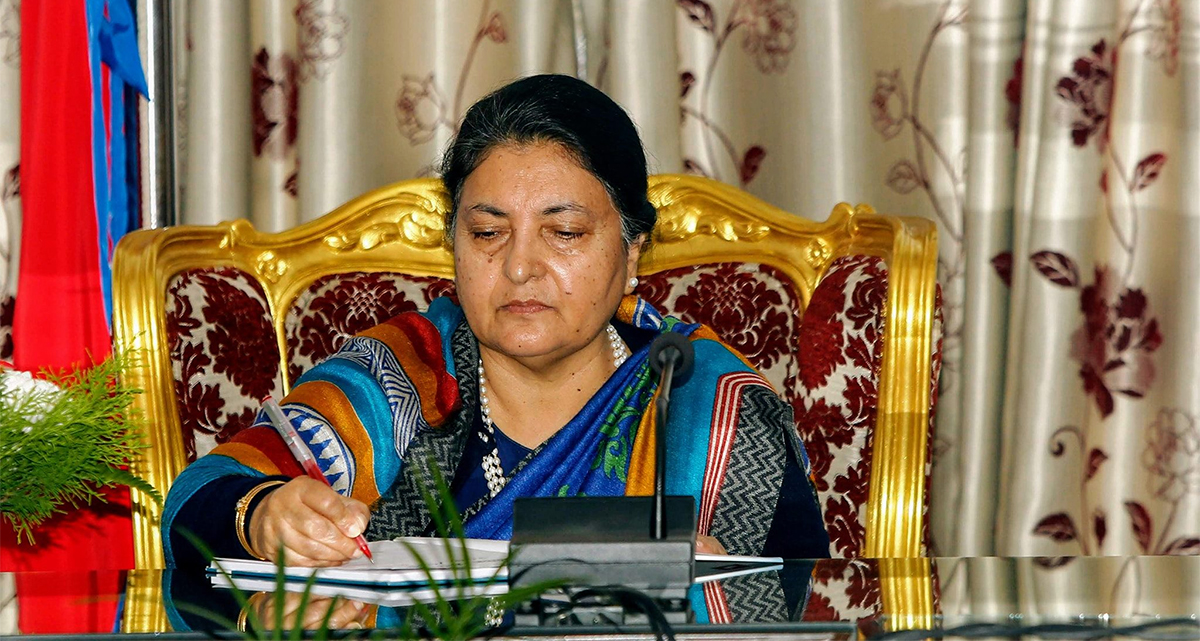Every post has its decorum and dignity. The post of president as a head of state also has its own decorum and dignity. The dignity of that post is related to the duties defined by the Constitution.
“Compliance and protection of the Constitution shall be the main duties of the President,” Article 61(4) of the Constitution states.
The oath of office and secrecy administered to the president also mentions, “Remaining completely faithful to the Constitution of Nepal…under prevailing laws…will perform with sincerity.”
President Bidya Devi Bhandari has failed in the main duty prescribed by the Constitution, and destroyed the decorum and dignity of the post of president.
There is a constitutional provision allowing the president to send back any bill submitted for authentication by the sovereign parliament for reconsideration. But the president must authenticate the bill within 15 days if the House again sends it to the president. She did not have any alternative to that and authenticating the Citizenship Bill was her constitutional duty.
Some legal professionals have argued that the Citizenship Bill has also automatically become inactive once the term of the House of Representatives (HoR) expired, and the president need not authenticate it. But that is not true.
“If the session ends when a Bill is still under consideration, the next session may take over the procedure.
Provided that, if a Bill is presented to the House of Representatives and is under consideration, or it is sent to National Assembly after passing it, but if the House of Representatives is dissolved while the Bill is still under consideration in the National Assembly, or if its tenure comes to an end, such Bill shall be considered not effective,” states Article 111(10) of the Constitution.
The Citizenship Bill was not under consideration in any House, and was submitted to the president after being endorsed by both the HoR and the National Assembly. The Constitution and laws do not envision any bill passed by both the HoR and the National Assembly becoming inactive. The Constitution, similarly, also does not envision the president not authenticating the bill sent to the president for the second time.
The president’s step, therefore, has raised serious questions about the Constitution and system. Can an individual who does not obey the Constitution continue as president or not? If we assume she can, then it will create a wrong precedent for those becoming president in the coming days. What will happen if a future president also defies any decision taken by the government or the parliament?
We will then be forced to wait anxiously whether the president will authenticate any bill sent after being passed by the House, whether the president will endorse the decision taken by the Cabinet or not. We will, in other words, reach a situation where the president, and not the parliament or the Cabinet with majority in that parliament, will exercise the sovereign powers of the people. That will vitiate our system in an irrevocable manner. That will afflict every prime minister that comes after election in the future and the parliamentary system. Every party that can get into the government will be eventually afflicted.
There is, therefore, the need for rule-based and long-term treatment of the arbitrariness displayed by the president now. One may say “The president did not honor the Constitution, we will also not honor the president.” Or even inform that the bill automatically comes into effect by publishing it in the Nepal Gazette. But that would be a response in rage. Anger does not make the Constitution and system stronger.
It is necessary to once again move the court to protect the Constitution and system, and to make them stronger, to take the president who has deviated from her responsibilities and constitutional duties to the dock of the court.
The court has already corrected President Bhandari for not fulfilling her constitutional duties appropriately. She had refused to appoint Sher Bahadur Deuba as the prime minister in accordance to Article 76(5) of the Constitution after 149 HoR members wrote to her to that regard defying the rights of the HoR to elect PM. The Supreme Court after a long hearing issued a mandamus instructing her to appoint Deuba as PM and administer oath of office and secrecy within 24 hours.
The SC, definitely, would look at this issue if anyone moves the court demanding that the president be asked to fulfill her constitutional duties. The court has already interpreted clearly that judicial remedy can be sought for presidential acts saying that the provision prohibiting filing of court cases against the president for works done in capacity of the president is limited only up to prohibiting making the president personally liable. But there remains no such limits about examination of the legal validity of the questions raised about use and implementation of the constitutional rights and provisions by the president.
That court verdict adds that no state official remains above the law or beyond the purview of law in a constitutional system incorporating democratic norms and values, and in rule of law. It reminds that keeping all presidential decisions beyond the purview of legal examination would ultimately lead to arbitrariness and autocracy.
This precedent clearly shows that the court can look at the dereliction of the constitutional duty by the president in not authenticating the Citizenship Bill.
It is necessary to take this issue to the court and conclude it there to show constitutional limits to the president who displayed arbitrariness by not authenticating the bill submitted to her after being passed by the parliament, and also to remind her successors about those limits.

